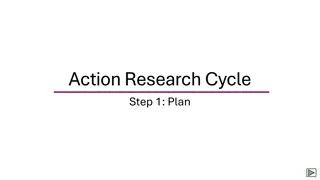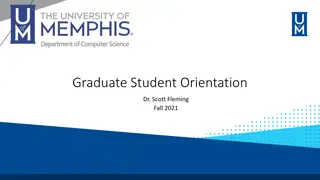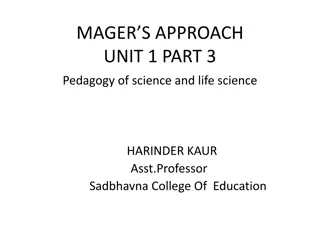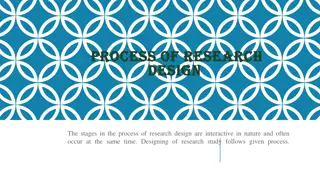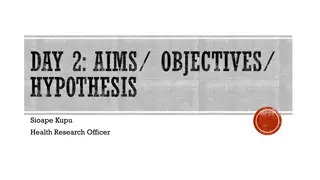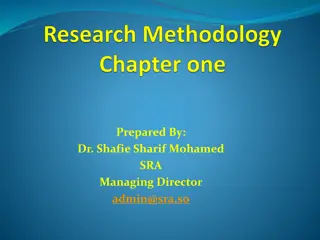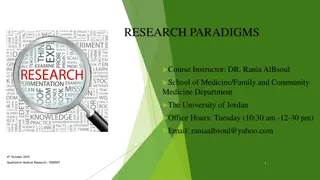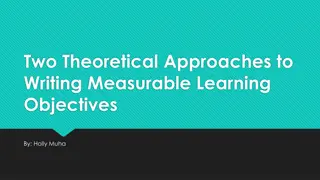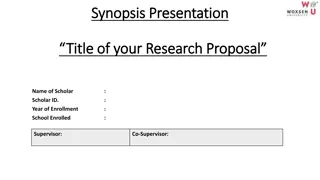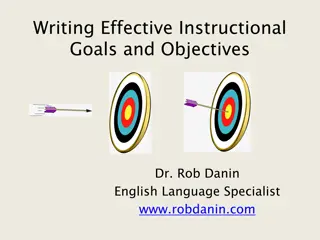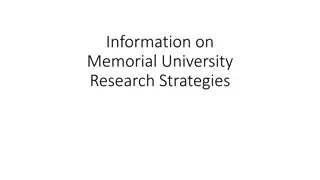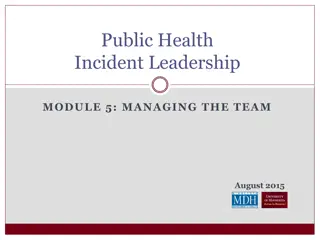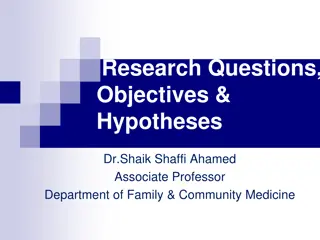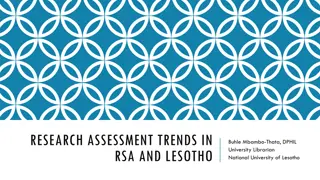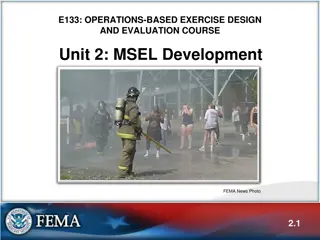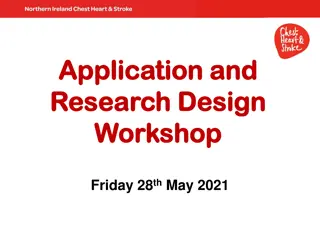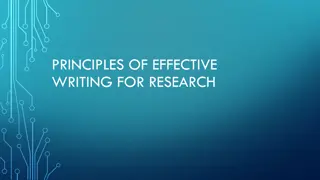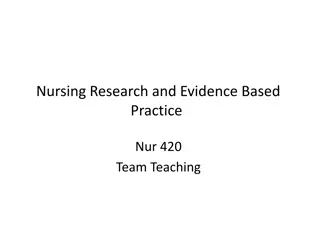Effective Marketing Research: Problem Definition, Decision Alternatives, and Research Objectives
Learn how marketing managers define problems, identify decision alternatives, and set research objectives for effective marketing research. Explore various research approaches, instruments, sampling plans, and contact methods to gather the needed information efficiently.
64 views • 19 slides
Addressing Contemporary Challenges in Research Security Program Development
The Workshop to Inform Development of the Research on Research Security Program (RRSP) focuses on safeguarding the research enterprise amidst evolving global threats. Led by Dr. Rebecca Keiser and Dr. Shawna Cox, the program aims to balance security measures while maintaining an open and collaborati
4 views • 16 slides
Safeguarding Canada's Research: Policy on Sensitive Technology Research and Affiliations of Concern (STRAC)
Canada's new Policy on Sensitive Technology Research and Affiliations of Concern (STRAC) aims to protect the country's research ecosystem from foreign entities posing security risks. The policy restricts funding for projects involving sensitive technology research if affiliated with military or stat
1 views • 10 slides
A Primer for Designing Quantitative Research Studies
This primer introduces the processes involved in designing a quantitative study, focusing on conceptualization and design basics. It emphasizes the importance of training, coursework, and experience for conducting high-quality scholarly research. The content covers the purpose of the primer, variati
8 views • 29 slides
Overview of Research Process and Quantitative Research Phases
The research process involves steps like identifying, locating, assessing, and analyzing the research question to find answers. It includes quantitative and qualitative approaches, with specific phases like conceptual, design, empirical, analytic, and disseminating phases in quantitative research. E
9 views • 27 slides
Importance of Formulating Clear Research Problems
Addressing a research problem is crucial in research endeavors as it guides the process, helps in setting objectives, and determines the direction of the study. Formulating a well-defined research problem aids in understanding the research procedure, clarifying objectives, designing the research pro
15 views • 7 slides
Action Research Cycle Step 1: Plan and Implementing Research Questions
Action research involves identifying a problem, forming research questions, and creating a research plan. It aims to understand situations, evaluate, problem-solve, and generate new ideas. Defining a research topic is crucial, focusing on the rationale and relevance. Selecting manageable topics dire
8 views • 17 slides
UCC Research Support and Strategies Overview
UCC's Research Support, Policy & Strategy function, led by David O'Connell, PhD, provides comprehensive support for research activities at the university. The office manages research funding, monitors performance, and facilitates engagement with external stakeholders. UCC's involvement in Horizon Eu
4 views • 17 slides
Graduate Student Orientation Fall 2021 - CS Department Overview
The Graduate Student Orientation for Fall 2021 at the CS Department led by Dr. Scott Fleming covers essential topics such as department mission, degree programs, faculty research areas, research impact indicators, and research opportunities within the department. Learn about the CS Department's high
1 views • 41 slides
Effective Proposal Writing for Health Research
Learn about the fundamentals of research proposals for health-related studies, including defining research, understanding the purposes of health research, and exploring motivation for undertaking research. Discover the difference between basic and applied research, examine types of research, and del
2 views • 70 slides
Financial Objectives in Business
Explore the importance of setting financial objectives in business, including the value they bring, examples of objectives such as increasing revenue and reducing debt, and the distinction between cash flow and profit. Financial objectives help businesses focus, measure success, reduce risks, and pl
0 views • 30 slides
Overview of Research Problem Identification and Formulation
Understanding the importance of defining a research problem, this content delves into the selection and formulation of research problems, the definition of a research problem, reasons for defining it, methods for identifying research problems, sources of research problems, and considerations in sele
1 views • 11 slides
Mager's Approach to Formulating Behavioral Objectives
Delve into the pedagogy of formulating specific objectives in behavioral terms based on Robert Mager's approach. Explore the elements and characteristics of objectives, performance objectives, and examples of behavioral objectives in a science lesson. Discover the advantages and limitations of Mager
1 views • 9 slides
The Process and Types of Research Design
The process of research design involves interactive stages occurring simultaneously, leading to the creation of a structured study. There are three main types of research design: exploratory, descriptive, and experimental (or causal). Each type has its own objectives and methods. Exploratory researc
0 views • 7 slides
Research Aims, Objectives, and Hypothesis in Health Research
This content delves into the importance of defining research aims, objectives, and hypotheses in health research. It explains how research aims clarify the study's goals, objectives outline specific tasks to achieve those goals, and hypotheses help in making predictions. It also discusses the proces
1 views • 17 slides
The Essence of Research: A Comprehensive Overview
Research is a systematic pursuit of new knowledge, aiming to unveil hidden truths through data collection and analysis. This course outline delves into the fundamentals of research, covering topics such as types of research studies, importance of research, and distinctions between pure and applied r
3 views • 32 slides
Behavioral Objectives in Education
Behavioral objectives in education are essential for effective teaching and learning. They provide clear direction on what students will achieve and how teachers can facilitate that learning. Different types of objectives, such as general and specific objectives, help in structuring educational goal
3 views • 13 slides
Epic Tools for Clinical Research by Shara Power, RN, BSN, OCN
Explore Epic tools for clinical research developed by Shara Power, a skilled application developer specializing in EPIC Beacon Oncology at UIHC Healthcare Information Systems. Learn about managing research study records, investigational study medication orders, and the process for creating and using
0 views • 26 slides
Research Paradigms in Qualitative Medical Research
Delve into the world of research paradigms in qualitative medical research with a focus on the key differences between objective and subjective research, the meaning of research paradigms, components of research paradigms, types of research paradigms, and how paradigms guide the selection of researc
1 views • 42 slides
Enhancing Learning Objectives for Effective Instruction
Learning objectives play a crucial role in student achievement, particularly in online courses. Measurable objectives provide clarity and focus, guiding learners towards specific outcomes. Understanding the differences between goals and objectives, as well as following guidelines such as Mager's cri
0 views • 14 slides
Guidelines for Selecting Research Project Topics in Environmental Health
Research is crucial for addressing environmental health issues. Choosing a good research topic is the first step towards effective research. This paper discusses the meaning, characteristics, types of research, and the research process to help in selecting appropriate research topics. Understanding
1 views • 15 slides
Comprehensive Research Training Programme in Social Sciences
Delve into the Research Training Programme offered by the Graduate School of Social Sciences, led by Professor Mark Tranmer. Explore the importance of research methods training, course offerings under the Research Training Programme (RTP), the Certificate in Social Science Research Methods (CSSRM),
7 views • 11 slides
Research Proposal: Objectives and Results Evaluation
This research proposal presentation focuses on outlining the objectives, methodology, and results of a doctoral study, providing insights into the project's progression and outcomes. It covers various objectives and their corresponding methodologies and results to evaluate the effectiveness and achi
0 views • 23 slides
DeakinAchieve Guide to Setting Your Performance Objectives
Learn how to set effective personal objectives in DeakinAchieve to maximize your contribution to Deakin University. This guide covers the process of choosing, tailoring, and reviewing your objectives with examples and tips for success. By setting meaningful objectives, you can fulfill your potential
0 views • 32 slides
Writing Effective Instructional Goals and Objectives in Education
Determine the importance of setting clear instructional goals and objectives for effective lesson planning in education. Explore the difference between goals and objectives, understand how to write instructional goals, and learn to create specific, measurable instructional objectives for student ach
0 views • 12 slides
Icelandic Research Fund 2015: Enhancing Scientific Research and Education
The Icelandic Research Fund (IRF) aims to enhance scientific research and education in Iceland by awarding funding to research projects led by individuals, teams, universities, research institutes, and companies. Principal investigators must have completed graduate studies and experience in running
1 views • 22 slides
Challenges in Self-Help Research in Germany
Exploring the landscape of self-help research in Germany reveals various challenges and obstacles faced by researchers in studying self-help initiatives. The research delves into different aspects such as research scope, involvement of various groups, and the entities conducting research in this dom
0 views • 14 slides
Memorial University Research Strategies Overview
Memorial University's research strategies focus on attracting, retaining, and supporting researchers, fostering an environment of research excellence, engaging with community partners, and supporting fundamental and applied research. The university's strategic priorities include synergy in applicati
1 views • 11 slides
Effective Management of Public Health Incidents: Objectives and Team Leadership
Learn the importance of distinguishing between management objectives and incident objectives, linking objectives to response activities, and leading an Incident Management Team through the Planning P process. Explore the difference between general management objectives and operational incident objec
0 views • 28 slides
Formulation of Research Questions, Objectives, and Hypotheses in Epidemiological Studies
Explore the importance of defining research questions, objectives, and hypotheses in epidemiological research, illustrated through examples from studies on diabetes mellitus in Saudi Arabia. Understand the steps involved in crafting clear objectives and hypotheses to address public health challenges
0 views • 37 slides
Research Assessment Trends in RSA and Lesotho: Issues, Challenges, and Forward Strategies
Research assessment in RSA and Lesotho involves evaluating research quality, measuring inputs, outputs, and impacts using both qualitative and quantitative methodologies. The prevailing practices include assessing research productivity for progression and utilizing various assessment mechanisms to e
0 views • 7 slides
Overview of Joint Programme on Nuclear Materials and European Energy Research Alliance
The Joint Programme on Nuclear Materials Sub-programme 4 focuses on modelling, correlations, simulations, and experimental validation in the nuclear materials field. The initiative aims to enhance research capabilities, accelerate energy technology development, and foster partnerships with industry.
0 views • 34 slides
Operations-Based Exercise Design Steps and Objectives Overview
This content provides a detailed overview of the steps involved in designing operations-based exercises, focusing on defining objectives using the SMART system. It emphasizes the importance of clear and concise objectives that are focused on player performance, with examples and guidelines for creat
0 views • 71 slides
Research Design and Funding Priorities in Northern Ireland
Dive into the world of research at the upcoming Application and Research Design Workshop scheduled for Friday, 28th May 2021. Discover the strategic priorities driving impactful research initiatives, learn about current research projects, funding processes, and collaborations. Explore the rich histo
0 views • 37 slides
Writing Research Papers Effectively: Guidelines and Steps
Effective writing for research involves developing a good research idea, writing a literature review, and understanding the key elements of writing research articles. This process includes coming up with a strong research question, gathering relevant information, creating an outline, writing the dra
1 views • 26 slides
Developing Medical Education Goals and Objectives
In this comprehensive guide, explore the crucial elements of setting goals and objectives in medical education. Learn how to formulate broad educational outcomes, create measurable methods to achieve these goals, and understand the importance of clear objectives. Discover various types of learner ob
0 views • 8 slides
Canada's Investment in Cancer Survivorship Research, 2005-2016 Highlights
The Canadian Cancer Research Alliance (CCRA) collaborates with various organizations to fund cancer research in Canada, focusing on prevention, diagnosis, treatment, and improving survivor outcomes. The CCRA is supported by the Canadian Partnership Against Cancer to implement strategies for cancer c
0 views • 25 slides
Nursing Research and Evidence Based Practice
Development and utilization of nursing knowledge are crucial for enhancing patient care. Nursing research plays a vital role in establishing a knowledge base for practice enhancement. This includes systematic studies of patient care problems and the evolution of nursing research in education, recrui
0 views • 39 slides
The Project Summary
Crafting compelling research objectives is crucial for NSF proposals. The project summary, outlining structure examples, and ways to state a research objective provide valuable insights. Learn how to frame your research, avoid common pitfalls in wording, and explore successful research objective exa
0 views • 18 slides
Getting Started with Research: Why Research is Fun and Important
Research is an exciting journey of discovery where you get to be a detective, make groundbreaking discoveries, and contribute to your field. Learn about the roles of research assistants and principal investigators, and essential qualities of being a good research assistant. This talk explores the fu
0 views • 31 slides






